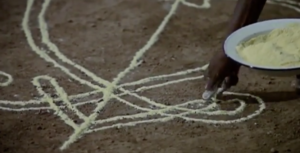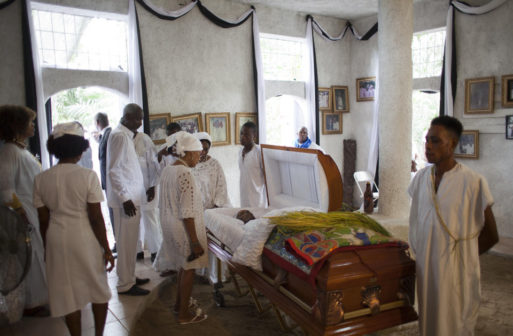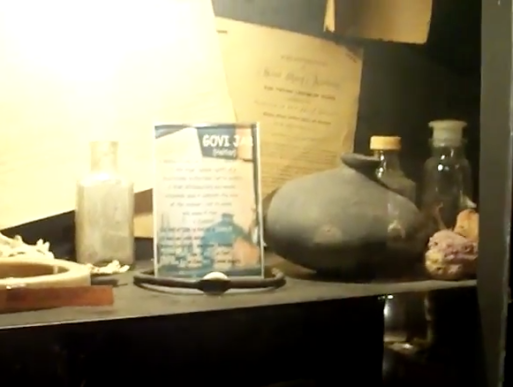According to The Guardian, Haitians have a saying that Haiti is 70 percent Catholic, 30 percent Protestant, and 100 percent Vodou. Vodou, or Voodoo as many call it, is a combination of Catholicism, other forms of Christianity, several African religions and folk magic.
Vodou is a religion passed on by word of mouth. There are no scriptures. Houngan, or male priests, and Manbo, or female priests, are available to perform rituals and rites and to provide counsel. Although Vodou is not the same in every location, most practitioners believe that a visible world is entwined with a spiritual world. There is a single, all-powerful god, but he remains aloof. Most people pray to spirits or ancestors.

Heart drawn on the floor in Vodou ritual
Credit: screen shot “Haiti 2016 – The time for Spirit” video
Vodou came to Haiti in the 1700s with the slaves brought over from Africa to work the cane fields. Under the influence of several powerful Vodou practitioners, many of the slaves revolted, killing their masters and taking over the land as their own. This made white slave owners afraid of Vodou, and they forbade its practice under penalty of death. Whites also made up frightening stories about Vodou, such as the practices of stabbing pins into Vodou dolls and creating zombies.
Today, Vodou practitioners still face discrimination and even lynching if they encounter a fundamentalist religious group. This may be because Vodou goes against social norms. For instance, the religion reveres members of the LGBTQ community and treats all genders equally.
A desperately poor country, Haiti has little access to modern medicine. The average lifespan is only about 60 years, and child mortality is high. The death of a friend or family member is practically a daily occurrence.
Vodou Death Rituals
Vodou practitioners believe that the soul enters the spirit world immediately after death. But for seven to nine days it stays close to the body. This is a hazardous time for the soul because an evil practitioner or a practitioner with a grudge can steal the soul and keep it from reaching peace.
After a week has passed, the Houngan or the Manbo performs a “Nine Night Ritual.” This rite frees the soul from its ties to the body and allows it to go to a place of dark water, where it stays for a year and a day.
At the end of this time, a priest performs a ritual called the “Rite of Reclamation” to transfer the soul into a clay jar called a govi. Then he or she destroys the govi in a ritualized way (for instance, shattering it at a crossroads). This sends the soul to the community of ancestral spirits. The spirit then enters the body of a family member or friend.
Vodou practitioners believe that LGBTQ people are especially receptive to souls. That is why the religion reveres members of this community.
The spirit later reincarnates 16 times and then enters the spirit world for good.
Family Assumes Responsibility
Most Haitians die at home, surrounded by loved ones who break into ritual wailing as death occurs. The eldest member of the family is responsible for making the arrangements for the handling of the body and the performance of the funeral rites. Another family member is elected to give the last bath, a sign of affection and respect.
The disposal of the body can be a problem, since whatever happens to the body can affect the spirit. Cremation is not an option, since Vodou forbids the destruction of the body. Most people prefer an above-ground mausoleum as a final resting place. But buying a mausoleum costs far more than most Haitians can afford. Instead, most families rent space in public mausoleums. When the first crucial year is over, or when the families can no longer afford to pay the rent, the body is burned. Some families have no choice but to abandon the body in a secluded spot and pray that no harm comes to their loved one’s spirit.
Vodou is a rich, vibrant religion that interweaves many systems of belief. Its rituals around death and dying ensure that the spirit goes on to be part of the world of ancestors who look out for their loved ones on earth.

 The Mystery and Magic of Haitian Vodou Funeral Rites
The Mystery and Magic of Haitian Vodou Funeral Rites




 “As Tears Go By” by Marianne Faithfull
“As Tears Go By” by Marianne Faithfull

 Funeral Favors Offer Visitors a Tangible Memento
Funeral Favors Offer Visitors a Tangible Memento















